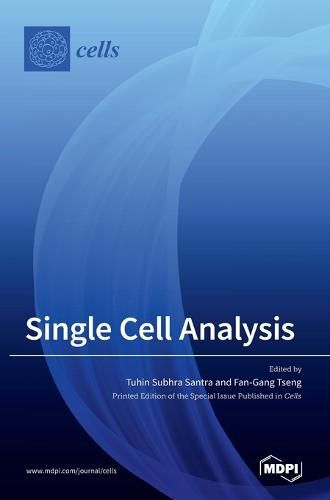Readings Newsletter
Become a Readings Member to make your shopping experience even easier.
Sign in or sign up for free!
You’re not far away from qualifying for FREE standard shipping within Australia
You’ve qualified for FREE standard shipping within Australia
The cart is loading…






This title is printed to order. This book may have been self-published. If so, we cannot guarantee the quality of the content. In the main most books will have gone through the editing process however some may not. We therefore suggest that you be aware of this before ordering this book. If in doubt check either the author or publisher’s details as we are unable to accept any returns unless they are faulty. Please contact us if you have any questions.
Cells are the most fundamental building block of all living organisms. The investigation of any type of disease mechanism and its progression still remains challenging due to cellular heterogeneity characteristics and physiological state of cells in a given population. The bulk measurement of millions of cells together can provide some general information on cells, but it cannot evolve the cellular heterogeneity and molecular dynamics in a certain cell population. Compared to this bulk or the average measurement of a large number of cells together, single-cell analysis can provide detailed information on each cell, which could assist in developing an understanding of the specific biological context of cells, such as tumor progression or issues around stem cells. Single-cell omics can provide valuable information about functional mutation and a copy number of variations of cells. Information from single-cell investigations can help to produce a better understanding of intracellular interactions and environmental responses of cellular organelles, which can be beneficial for therapeutics development and diagnostics purposes. This Special Issue is inviting articles related to single-cell analysis and its advantages, limitations, and future prospects regarding health benefits.
$9.00 standard shipping within Australia
FREE standard shipping within Australia for orders over $100.00
Express & International shipping calculated at checkout
This title is printed to order. This book may have been self-published. If so, we cannot guarantee the quality of the content. In the main most books will have gone through the editing process however some may not. We therefore suggest that you be aware of this before ordering this book. If in doubt check either the author or publisher’s details as we are unable to accept any returns unless they are faulty. Please contact us if you have any questions.
Cells are the most fundamental building block of all living organisms. The investigation of any type of disease mechanism and its progression still remains challenging due to cellular heterogeneity characteristics and physiological state of cells in a given population. The bulk measurement of millions of cells together can provide some general information on cells, but it cannot evolve the cellular heterogeneity and molecular dynamics in a certain cell population. Compared to this bulk or the average measurement of a large number of cells together, single-cell analysis can provide detailed information on each cell, which could assist in developing an understanding of the specific biological context of cells, such as tumor progression or issues around stem cells. Single-cell omics can provide valuable information about functional mutation and a copy number of variations of cells. Information from single-cell investigations can help to produce a better understanding of intracellular interactions and environmental responses of cellular organelles, which can be beneficial for therapeutics development and diagnostics purposes. This Special Issue is inviting articles related to single-cell analysis and its advantages, limitations, and future prospects regarding health benefits.